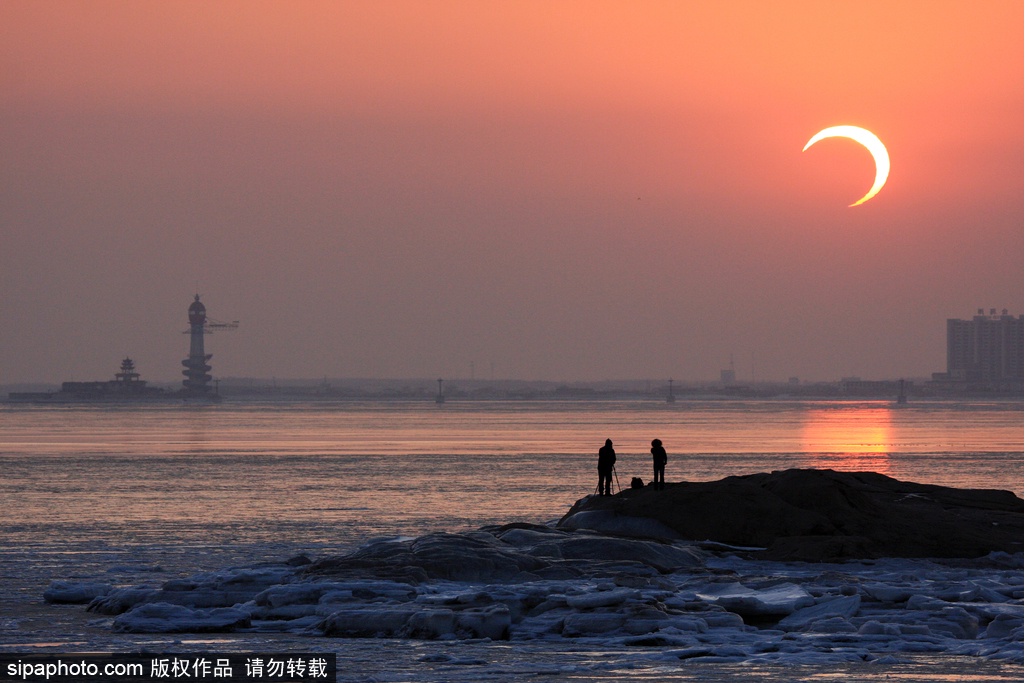Millions of Chinese netizens and amateur astronomers across the nation enjoyed the awe-inspiring sight of a rare solar eclipse on Sunday afternoon.
The rarely seen natural phenomenon where a portion of the Earth is covered in the shadow cast by the moon which fully or partially blocks the sunlight, occurs when the sun, moon and Earth are aligned. This year, the timing of this eclipse also coincides with the summer solstice, the longest day of the year in Earth's Northern Hemisphere.

Tens of millions of excited stargazers followed the event online, via live-streaming services provided by agencies such as CCTV and People's Daily as well as the Xinhua News Agency.
Some residents in Southwest China and southeastern parts of China commented online despite the rainy and cloudy weather on Sunday, they could still observe the phenomenon online.
The hashtag #livestreamingeclipse ranked No. 1 among the Weibo hot topics on Sunday afternoon, gathering views and discussions by more than 500 million users.
Hu Fanghao, an engineer with the Purple Mountain Observatory in Nanjing, East China's Jiangsu Province, told the Global Times on Sunday that this is the only chance in 21st century that the solar eclipse takes place exactly on the summer solstice and is also visible in China.
According to a live-stream on Sina Weibo by the Central China Television (CCTV,) Wang Xiaofeng, head of the Beijing Planetarium, explained that an almost perfect eclipse with a coverage of 99.7 percent could be observed in Ali, Southwest China's Tibet Autonomous Region, whereas 99.4 percent coverage could be observed in southeastern parts of China on Sunday afternoon.
Observers in some areas of Tibet, Southwest China's Sichuan Province, East China's Fujian Province and the island of Taiwan could enjoy the sight of a total eclipse, Wang said.
Beijing residents witnessed a partial solar eclipse with coverage of 55.7 percent, which started at around 2:33 pm, reached maximum eclipse at around 3:50 pm and then ended at around 5 pm.
Millions of excited stargazers followed the event online, via live-streaming services provided by agencies such as CCTV and People's Daily as well as the Xinhua News Agency.
Some residents in Southwest China and southeastern parts of China commented online despite the rainy and cloudy weather on Sunday, they could still observe the phenomenon online.
A 300-millimeter vacuum telescope at the Beijing Planetarium was deployed for the eclipse observation, among other large astronomical devices across the country.
"The reason why this eclipse gathered such huge attention among Chinese netizens is that China has made solid progress in building relevant, word-beating devices, such as the world-renowned FAST in Guizhou Province," Wang told CCTV.
FAST is the acronym for Five-hundred-meter Aperture Spherical Telescope, located in Southwest China's Guizhou, which has reportedly detected nearly 100 pulsars in the universe.
Many netizens also made online wishes during the event.
"I hope I can pass the upcoming college entrance examination," wrote one Weibo user, a wish that was echoed by many. Others asked for quick reunions with loved ones.
"Come on, it's only a natural event. Save the superstitions," wrote another.
The sighting of eclipses has inspired many scientific feats, including the discovery and detection of solar prominence, solar corona as well cosmic rays, according to scientists.
The hashtag #livestreamingeclipse ranked among the Weibo top 10 hot topics on Sunday afternoon, gathering views and discussions by more than 300 million users.



